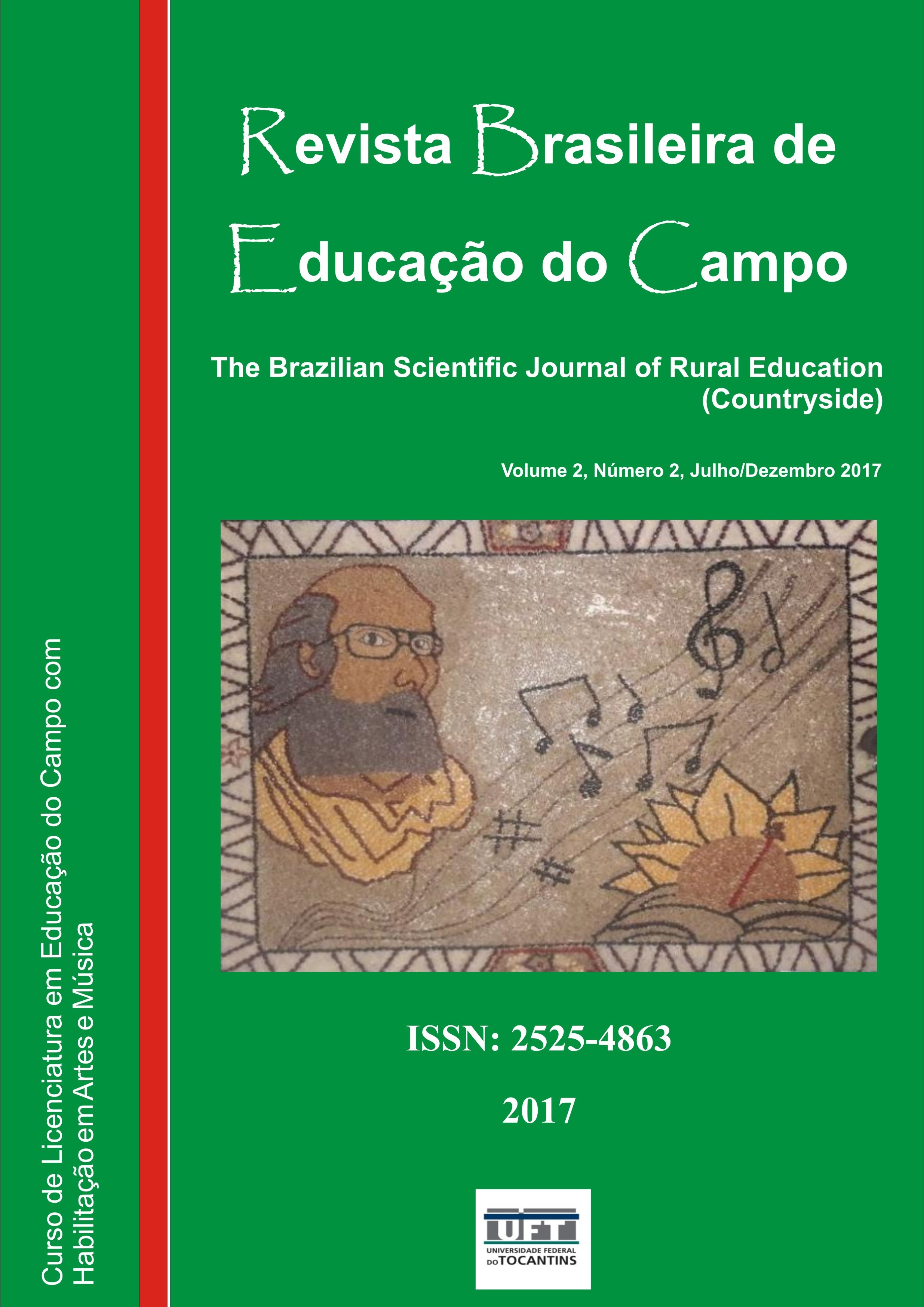The contribution of the History of Science for teachers training in Rural Education
DOI:
https://doi.org/10.20873/uft.2525-4863.2017v2n2p632Abstract
ABSTRACT. The present work aims to analyze, from a critical-dialectical perspective, aspects of the History of Sciences and the importance of the externalist approach in the teachers training of rural education. The analysis undertaken took as a reference the activities developed in the curriculum component History of Sciences of a course of degree in Rural Education. These activities allowed exploring aspects of the Nature of Science in an integrated way with the social, political, economic, ethical and scientific context of the rural population. The results indicate that activities based on an externalist approach make possible a new vision on the evolution of the concepts of Science, contributing positively to the Teaching of Sciences in Rural Education.
Downloads
Literaturhinweise
Abd-El-Khalick, F., & Lederman, N. G. (2000). Improving science teachers’ conceptions of the nature of science: a critical review of the literature. International Journal of Science Education, 22(7), 665-701.
Arroyo, M. G., Caldart, R. S., & Molina, M. C. (Orgs.) (2004). Por uma Educação do Campo. Petrópolis: Vozes.
Arroyo, M., & Fernandes, B. M. (1999). A Educação Básica e o Movimento Social do Campo. Brasília. DF: Articulação Nacional Por Uma Educação Básica do Campo.
Angotti, J. A. P., & Auth, M. A. (2001). Ciência e Tecnologia: Implicações sociais e o papel da educação. Ciência & Educação, 7(1), 15-27.
Anunciação, B. C. P., Messeder-Neto, H. S., & Moradillo, E. F. (2014). Robert Boyle no contexto da transição para a ciência moderna: elementos para uma análise sócio-histórica. Ideação, 1, 165-192.
Bachelard, G. (1996). A formação do espírito científico: contribuição para uma psicanálise do conhecimento. Rio de Janeiro: Contraponto.
Bassalo, J. M. F. (1992). A importância do estuda da História das Ciências. Revista da SBHC, 8, 57-66.
Bernal, J. D. (1975). Ciência na história. Lisboa: Livros Horizonte, 1.
Brasil. (1998). Secretaria de Educação Média e Tecnologia. Parâmetros Curriculares Nacionais: terceiro e quarto ciclos do ensino fundamental – Ciências Naturais. Brasília. MEC/SEMTEC.
Brasil. (2002). Diretrizes Operacionais para a Educação Básica nas Escolas do Campo. Brasília: MEC/SECAD.
Caldart, R. S. (2002). Por uma Educação do Campo: traços de uma identidade em construção. In Kolling, E. J., Cerioli, P. R., & Caldart, R. S. (Orgs.). Articulação Nacional Por uma Educação do Campo. Brasília-DF.
Chassot, A. (2006). Alfabetização científica: questões e desafios para a educação. Ijuí: Ed. Unijuí.
D’Ambrósio, U. (1994). A Etnomatemática no processo de construção de uma escola indígena. Em Aberto, 14(63), 92-99.
D’Ambrósio, U. (1998). Etnomatemática. São Paulo: Ática.
D’Ambrósio, U. (1996). Educação Matemática: da teoria à prática. Campinas, São Paulo: Papirus.
D’Ambrósio, U. (2002). Etnomatemática. Elo entre as tradições e a modernidade. Belo Horizonte: Autêntica.
Forato, T. C. M. (2009). A Natureza da Ciência como Saber Escolar: um estudo de caso a partir da história da luz. (Tese de Doutorado). Universidade de São Paulo, São Paulo.
Gerdes, P. (1991). Etnomatemática: Cultura, Matemática, Educação. Maputo: Moçambique.
Hernández-González, M., & Prieto-Pérez, J. L. (2000). Un currículo para el estudio de la Historia de la Ciencia en secundaria (la experiencia del seminario Orotava de Historia de la Ciencia). Enseñanza de las Ciencias, 1(18), 105-112.
Pérez, D. G., Montoro, I. F., Alís, J. C., Cachapuz, A., & Praia, J. (2001). Para uma imagem não deformada do trabalho científico. Ciência & Educação, 7(2), 125-153.
Hage, S. M. (2006). Movimentos Sociais do Campo e a afirmação do direito à educação: pautando o debate sobre as escolas multisseriadas na Amazônia paraense. Revista Brasileira de Estudos Pedagógicos, 217, 302-312.
Höttecke, D. (2000). Wow and what can we learn from replicating historical experiments? A case study. Science & Education, 9, 343-362.
Knijnik, G. (1993). O saber acadêmico e o saber popular na luta pela terra. Educação Matemática em Revista, 1, 5-11.
Martins, A. F. P. (2007). História e Filosofia da Ciência no ensino: há muitas pedras nesse caminho. Caderno Brasileiro do Ensino de Física, 24(1), 112-131.
Moura, B. A., & Silva, C. C. (2007) A Óptica Newtoniana No Século XVIII: O Que Podemos Aprender com esse Episódio? In VI Encontro Nacional de Pesquisa em Educação em Ciências – SC, Florianópolis.
Nascimento, V. B. (2004) A natureza do conhecimento científico e o ensino de ciências. In Carvalho, A. M. P. C. (Org.). Ensino de Ciências: unindo a pesquisa e a prática (pp. 35-57). São Paulo: Pioneira Thomson Learning.
Peduzzi, L. O. Q. (2001). Sobre a Utilização Didática da História da Ciência. In Pietrocola, M. (Org.). Ensino de física: conteúdo e epistemologia numa concepção integradora (pp. 151-170.). Florianópolis: Ed. da UFSC.
Scheid, M. N. J. (2008). Contribuições do cinema na formação inicial de professores de Ciências Biológicas. Vivências: revista Eletrônica da URI, 6(4), 15-21.
Tripp, D. (2005). Pesquisa-ação: uma introdução metodológica. Educação e Pesquisa, 31(3), 443-466.
Villani, A., Pacca, J. L. A., & Freitas, D. (2008). Science teacher education in Brazil: 1950-2000. Science & Education, 18, 125-148.
Pires, A. M. (2012). Educação do Campo como direito humano. São Paulo: Cortez.
Veröffentlicht
Zitationsvorschlag
Ausgabe
Rubrik
Lizenz
Creative Commons Attribution License
Creative Commons Attribution License
Proposal for Copyright Notice Creative Commons
1. Policy Proposal to Open Access Journals
Authors who publish with this journal agree to the following terms:
A. Authors retain copyright and grant the journal right of first publication with the work simultaneously licensed under the Creative Commons Attribution License that allows sharing the work with recognition of its initial publication in this journal.
B. Authors are able to take on additional contracts separately, non-exclusive distribution of the version of the paper published in this journal (ex .: publish in institutional repository or as a book), with an acknowledgment of its initial publication in this journal.
C. Authors are permitted and encouraged to post their work online (eg .: in institutional repositories or on their website) at any point before or during the editorial process, as it can lead to productive exchanges, as well as increase the impact and the citation of published work (See the Effect of Open Access).














